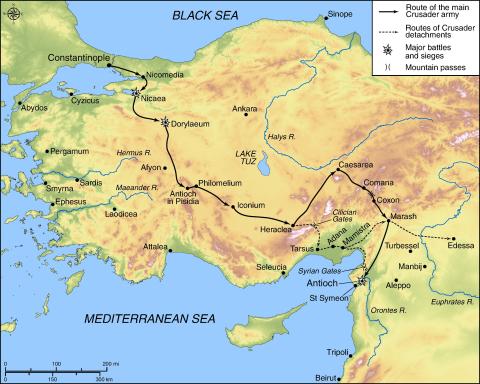The Road to Antioch
[4.11.3] Sequentī nocte audīvit Boamundus quod Turcī, quī fuerant in obsessiōne cīvitātis, frequenter praecēderent nōs. Mox praeparāvit sē sōlummodo cum mīlitibus, quātinus illōs undique expugnāret, sed eōs invenīre nōn potuit.
[4.11.4] Deinde vēnimus ad quandam urbem nōmine Coxōn, in quā erat maxima ūbertās omnium bonōrum quae nōbīs erant necessāria. Chrīstiānī igitur, vidēlicet alumnī urbis illīus, reddidērunt sē statim, nōsque fuimus ibi optimē per trēs diēs, et illīc maximē sunt recuperātī nostrī. Audiēns itaque Raimundus comes quod Turcī quī erant in cūstōdiā Antiochīae discessissent, in suō invēnit cōnsiliō, quod mitteret illūc aliquōs ex suīs mīlitibus, quī eam dīligenter cūstōdīrent. Tandem ēlēgit illōs quōs lēgāre volēbat, vidēlicet Petrum dē Castelliōne vicecomitem, Willelmum dē Monte Pisleriō, Petrum dē Roasā, Petrum Raimundum dē Pul, cum quīngentīs mīlitibus.
notes
vocabulary
4.11.3
frequenter: in large numbers
sōlummodo: only, alone
quātinus: how far; how (CL); that (ML)
undique: anywhere, wherever they might be (ML); from all sides (CL)
4.11.4
alumnus –ī, m.: son, child (OLD 2)
legō (1): to send as an envoy; appoint
quingentī –ae –a: five hundred

